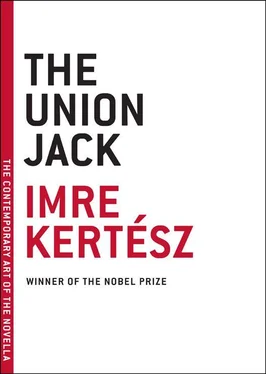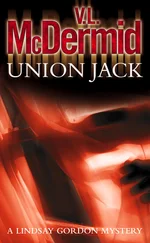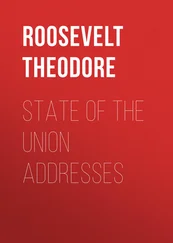So much, then, for the story of the Union Jack. “Johnny rejoiced wholeheartedly in the prospect of the fight — I think that neither he nor Brattström would have shared my apprehensions,” I read during the severe winter that soon set in, during which my aforementioned ailment flared up again, so to speak, in the form of a fever of reading, or perhaps it was my reading fever which flared up again not long afterwards in the form of the aforementioned ailment. “Johnny repeatedly assured me, with the delightful rolling of his r’s, that the two boys were in deadly earnest and certainly meant business. Complacently and with a rather sardonic objectivity, he weighed the chances of victory for each … He gave me my first impression of the peculiar superiority, so typical of the English character, which later on I came so greatly to admire,” I read.
What naturally also belongs to the story, perhaps needless to say, is that several days later, on that same bend in the road, but coming from exactly the opposite direction to that in which the Union Jack had disappeared, tanks suddenly veered into sight. All but wavering in their haste, their uneasiness, their fear, they always paused for a moment at that bend. And though the road, the pavement, the district, the city, everything was by now wholly deserted, with not a person, not a sound, not a soul to be found anywhere, the tanks, as if anticipating even a stray embryonic thought, each and every time let off a single cannon round, strictly one, before clattering onwards. Since the gun position, direction, and trajectory were always the same, for days on end they always pounded the same first-floor windows, outside and eventually interior walls of the same decrepit, Secessionist-style apartment block, so that finally the yawning void looked for all the world like a corpse’s mouth, gaping in terminal wonderment, all of whose teeth were about to be knocked out one by one.
But here we really do reach the end of the story of the Union Jack, this sad but maybe not all that significant story. It would never have entered my head to tell it had that friendly gathering of former students, mustered to celebrate, there’s no denying it, my all-too-round-numbered birthday, not appealed to my better nature, while my wife was busy in the kitchen preparing a cold snack and drinks for them. For them, they said, for “younger people,” there are no longer any, as they put it, “primal experiences,” they only ever know and hear about tales of heroism and horror stories, or perhaps horrific tales of heroism and heroic horror stories … that birthdays are a fine thing but, with due consideration to my fluctuating blood pressure, my “revolutionary” pulse of at best forty-eight beats per minute, the pacemaker that I will anyway, sooner or later, find is unavoidable … not to put too fine a point on it, lest I too should take my stories and experiences, my whole knowledge of life, with me to the grave, when there are hardly any more authentic witnesses and tellable tales, and that they — a “generation,” as they put it — are left here with their wealth of objective but totally lifeless and routine knowledge and facts … and so forth. I tried to reassure them that there was nothing wrong about this; that, anecdotes apart, every story and everybody’s story is one and the same story when it comes down to the essentials, and that these essentially selfsame stories are really essentially all horror stories; that essentially every event is really a horror event, and even history too had long, long ago become, essentially, at best just horror history. But then how was it, they asked at this point, that in the course of my own particular horror history I was able to recount spiritual and intellectual experiences of the kind that I had recounted; what had become of the continuation of what, in the course of my account, I had called “my mission”; or had I, perhaps, given up on the “mission”; moreover, what had stood out for them from my entire story was something, they said, that they had actually always suspected and assumed about me, namely, that by retreating inconspicuously into my own narrow area of expertise, I had lived a diminished life though I might also have pursued an intellectual existence and, if merely in my area of expertise, been creative — in other words, as they said, where and how had the “break” in my, so to say, “career” occurred. I was staggered to hear this, for it meant I had told them the story of the Union Jack to absolutely no purpose; it seems that they, children of destruction, no longer understand, are unable to understand, that the devastation of total war was turned by total peace into complete and, so to say, perfect destruction. Just one remark about an intellectual existence: even if I had happened to pursue an intellectual existence, I could only have done this at the price of self-denial; that is, I could only have pursued at best the appearance of an intellectual existence; thus, whether I chose an intellectual existence or I chose to forsake an intellectual existence, in any event self-denial had been the one and only choice open to me. And so, reckoning that naturally they would anyway not understand, were unable to understand, I tried to explain to them that it was not at all a matter of my, as it were, “relinquishing” what I had characterised as my mission, which is to say that there should no longer be a contradiction between my way of life and its formulation, or at least not a radical contradiction. I cited that great philosopher of history, Wilhelm Dilthey, with whom I had endeavoured — so far as I could, so far as I was free to do so — to familiarise them, my former students, when they were still in their student years: “Understanding presupposes living, and an event only becomes a life experience if understanding guides living out of its narrow and subjective being into the realm of the whole and the general.” I, so I feel, had done that. I had understood that I could only be creative here in the act of self-denial; that the sole creation possible in this world, as it is here , is self-denial as creation . I may have expressed myself extremely, but that doesn’t matter, since they didn’t understand anyway: to that extent, and in consistent cognisance of that, I told them, I had lived, understood, and fulfilled, if I may put it this way, the morally obligatory experience of life — life as it is here , and to that extent my life is a life of paying witness — so I am content. I reminded them of the formulations cited in the story, the story of the Union Jack: “For this cause came I into the world, that I should bear witness unto the truth,” and “I was Ernő Szép.” There is no more ultimate lesson, no more complete experience, than those. As to what this is all for, what precisely this is for, what experience is for — that’s another question, I reflected later. Who sees through us? Living, I reflected, is done as a favour to God. And whilst attention turned to the arrival of the dishes, the glasses raised and clinked in celebration of my birthday, I reflected, if not exactly with impatience but with a certain sense of expectant relief, that the more promising future which is nowadays threatened from all sides is something that I myself neither have to live through nor understand.
TITLES IN THE COMPANION SERIES
THE ART OF THE NOVELLA
BARTLEBY THE SCRIVENER / HERMAN MELVILLE
THE LESSON OF THE MASTER / HENRY JAMES
MY LIFE / ANTON CHEKHOV
THE DEVIL / LEO TOLSTOY
THE TOUCHSTONE / EDITH WHARTON
THE HOUND OF THE BASKERVILLES / ARTHUR CONAN DOYLE
THE DEAD / JAMES JOYCE
Читать дальше












